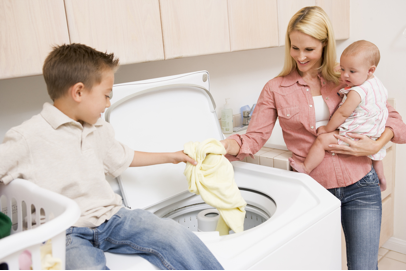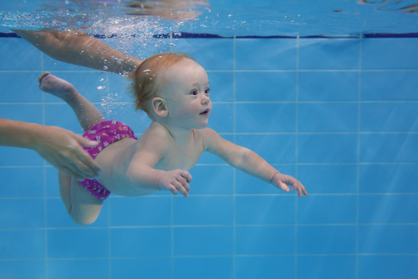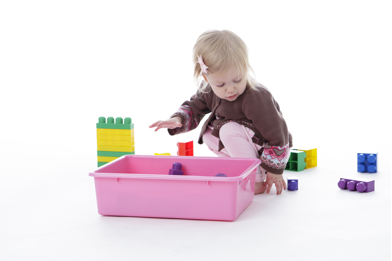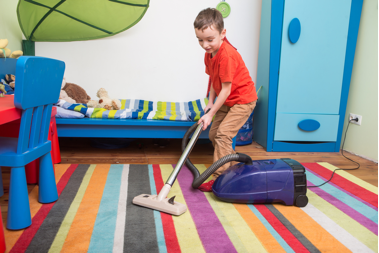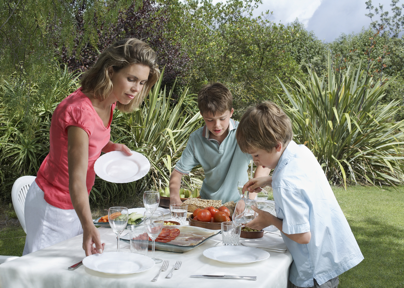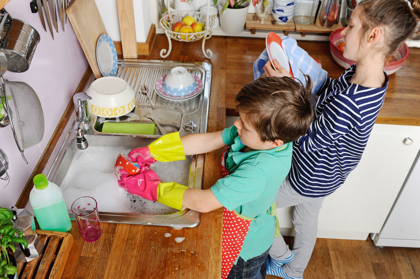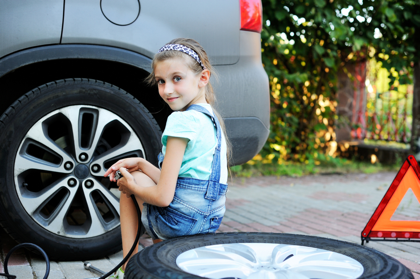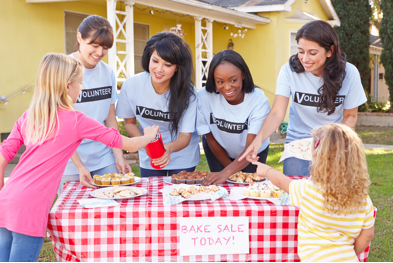21 Things Your Child Should Be Able to Do…And Should Do By The Age of 12
Ok. Maybe the picture above isn’t the best choice, but I’ve put it at the beginning because I want you, as a fellow parent, to remember that kids doing their chores can be fun! It doesn’t always have to be a struggle…and sometimes it’s going to get messy as they learn! As the parent of three children, trust me. I know!
It was important to my wife and me that our kids grew up to be independent and self-reliant. Of course, we wanted this to be balanced by healthy dependency so that they would also feel comfortable asking for help when they needed it. When they skinned their knee, we were there to console them. When they acted up, we were there to set boundaries on what was and was not acceptable. We praised them for taking courageous steps in their own growth.
We also want them to know that they are intrinsically loved just because they exist. Not necessarily for what they do. But there’s another side to this coin.
Praise isn’t enough
Children’s self-esteem is also based on tasks that they master. This is particularly true for tasks that they can accomplish that are age appropriate. Children who can do for themselves seem to grow up to be much happier because they know at the end of the day, they can rely upon themselves to accomplish the everyday basic tasks of life. They’ve had success in their childhood mastering various life skills.
Learning to launch
Conversely, adults who as children, were spoiled, over-indulged, excessively pampered or catered to don’t seem to fair as well in life and in their personal and professional relationships. In other words, they are simply children who failed to grow up…or as the title of the movie points out: Failure To Launch.
So why is that? Why do they fail to grow up? When we’ve overindulged or catered to them, our kids learned to believe that their parents, housekeepers, or other adults in their lives will simply do for them what they could do for themselves. For example, if we don’t require them to pick up their rooms, what do you think will be the end result? Here’s what it can sadly look like:
They may learn that they can get away with anything.
They may also learn that they are not competent enough to pick up after themselves.
They become entitled.
They are ungrateful.
They view their family as a one-way street.
Others are there to take care of them.
They don’t see that they are part of the family other than what the family can do for them.
They fail to grow naturally. As a result, they reach the age of 18, go out into the world, and realize that they don’t even know how to do their own laundry because somebody else did it for them.
It probably isn’t reasonable to expect a toddler to do basic laundry, but by the time they are 7 or 8, they should know the basics about getting their clothes washed. Give them a footstool, a box of detergent, and show them how to run the clothes washer and the dryer. In the beginning, you will need to supervise them if you don’t want an ocean of soap bubbles in the laundry room! But pretty soon, they will get the hang of it, and you won’t have to answer the demand of “Where’s my uniform?” because they will be responsible for their own laundry.
I mean, you can easily teach a 6-year-old to do basic laundry if you’re motivated to do so.
This leads me to the most important thing you have to ask yourself:
Am I the problem?
Unless your child suffers from a severe physical disability, they should be able to perform basic life skills. If they are not or refuse to, the problem is not with our child. The problem is with us, as parents.Here are some reasons parents have admitted to over the years for why they didn’t push their children to participate in household chores. I have always appreciated their honesty. Some of these also applied to me when I was a younger parent.
I’m so tired of fighting with my child about making their bed. It’s just easier to do it for them.
I hate to admit this. But I am very invested in my child liking me. I am afraid that if I make them clean their room, that they will be upset with me.
It’s too late in the day for them to take a bath.
They have too much homework. They don’t have time to put out the trash tonight.
They’re too young to ______________ (fill in the blank).
The list can go on and on. The point is this: We can always find ways to excuse why we are going to keep them little. When we do, we simply become enablers.I know about this first hand. Although all three of our children launched very well, there were times when they were younger when either my wife or I just threw up our hands in frustration and, for example, picked up their rooms when they were fully capable of doing it themselves. Gladly, this was the exception to the rule. And The Rule was this:
"If you can do it for yourself, do it!"
We used The Rule for one simple reason. We felt an obligation to help our children become empowered human beings who could function at a high level in the real world. Don’t we owe it to our kids to do precisely that?
One more thing. You are inevitably going to encounter those times when your child says, “I don't want to do this.” That’s fine. They are allowed to have their feelings about it and “not want” to do it. However, so long as it’s age appropriate to their skill level, they still have to do these things.
Remember: you’re a parent. Not a potted plant.
It’s your job to transmit these basic life skills to your children. You can’t be concerned with whether or not they want to learn them. You can talk about their feelings with them. That’s fine. But at the end of the day, you have to make your own choice to be a responsible parent, even if YOU don’t want to.
Also, if you haven’t started with any of the following, don’t worry. It’s never too late to start!
21 Things by Age 12
Now that we have all of that covered, here are reasonable, practical, and useful life skills that your child should be able to do…and be expected to do by the time they reach the age of 12. It is obvious that many of these life skills can and will be learned at much younger ages.
When they master these skills, they will enjoy greater self-esteem, embrace the idea of taking responsibility, feel more productive, and more confident, become better team players in life, and ultimately much happier than their counterparts who aren’t as accomplished.
1. Learn water safety! This was one of the very first skills that my parents insisted we learn by the age of eighteen months. Now we recommend even sooner than that.
2. Children should know and respect the basic rules. As appropriate to their age, they should know, agree, and follow reasonable rules for health, safety, courtesy, telling the truth, moral basics, and reasonable expectations of household chores.
3. Put away bath towels and facecloths. Why should I pick up my kid’s towel when they are perfectly capable of doing it themselves?!
4. Learn to say “Please” and “Thank you.” These are the most basic manners everyone should use.
5. If you would like them to be even more polite, teach them to say, “Yes sir” and “Yes ma’am,” or "No ma’am” and “No sir.”
6. Put their own toys away. For your part, you can make it easy for them to do so. Those small plastic boxes you can buy at your favorite local shopping spot are very helpful!
7. Know how to access emergency services by dialing “911.” They should also be able to memorize their own address by the age of 4 or 5 at the latest.
8. Learn how to ride a bicycle. And, yes, they’re going to fall as they learn.What is important is that they don't quit. They need to learn how to get up, dust themselves off, and get back on the bike. This builds resilience and perseverance, and we also know that these are very good traits to have in life now, and as they get older.
9. Learn how to vacuum. It’s not rocket science! Just make sure that ONLY YOU are connecting and disconnecting the electric plug!
10. Help clean up messes, especially ones that they make!
11. Help set the table.
12. Learn how to cook. This can be a fun activity that helps encourage our children to help nurture our family as a unit. Cooking together teaches the value of teamwork and another adage that will likely prove valuable as they get older: “Many hands make for light work!”
A great place to start is for them to learn how to make a basic breakfast and pack a school lunch. This is a fundamental skill that a child should learn by the time they are 8 or 9 at the latest.
To help this along, try to keep foods around that are easy for them to prepare. Sandwiches, basic scrambled eggs, and fruit cut for them in advance are great beginner-level options. For most kids, putting together turkey, cheese, lettuce, bread, and fresh fruit in plastic baggies or containers and into their lunch box is not that complicated!
As your child approaches the age of 12 or so, ask them to plan at least one or two meals a month and also to cook that meal. This is a great time to talk a bit more in depth about good nutrition and balanced meals.
13. Clear the table and do the dishes, either by hand or teach them how to place dishes in the dishwasher and load the soap dispenser. Easy peasy!
14. Take care of the family pet, including feeding and cleaning up poop.
15. Keep track of their school items – including homework, lunchbox, etc. If your child forgets their backpack or their homework, or they lose their lunchbox, you can’t rescue them every time. They will not learn how to be responsible for important belongings if you are bringing their things each time they forget about it. I generally gave my kids a once-per-year pass when I would bring them something they forgot. Beyond that, they were on their own.
Children approaching the age of 12 should now be able to:
16. Sew a button on a shirt or blouse. A lost art, but so very necessary!
17. Wash a car. This can start earlier when helping mom or dad at first.
18. Put air in a tire. They aren’t driving by the age of 12, but this helps prepare them for when they will be in just a few years.
19. Be involved in at least one ongoing effort to benefit their community. It could be volunteering for a local charity such as a food bank, the American Red Cross, Relay For Life, or holding a fundraiser like these girls are doing.
I also strongly recommend that whatever charity they are involved in, that it is something that resonates with them – something that they are interested in. This will increase the chances that they will always think of the well-being of others as a natural part of their lives both now and when they become fully participating adults.
20. Find specific ways to experience and express gratitude. There is a direct correlation between those who feel and show their gratitude and are generally happier than those who take life and others for granted.I firmly believe that we do not spoil our children with what we give them. We spoil them with what we don’t give them. Good values. As your child learns the basic life skills above, learning gratitude is probably the most important life skill. The best time for them to develop this value is when they can begin to say these two words: “Thank you.”
Feeling gratitude will help them appreciate what they have in their life. I call gratitude the “elixir of happiness.” It is never too late to develop this life skill and never too late to express your appreciation.
21. ________________________ . I’ve intentionally left this last life skill item blank.The skills I have outlined above are considered to be universal, but my list certainly does not include all the important life skills.
Take a few moments and ask yourself this: What would I like to add to this list?
I hope that this article has been helpful to you as a parent and, ultimately, for your children. As a former school teacher, a marriage and family therapist, and the father of three, I would like to invite you to contact me if you would like to learn more about these and other great life skills for your child.


